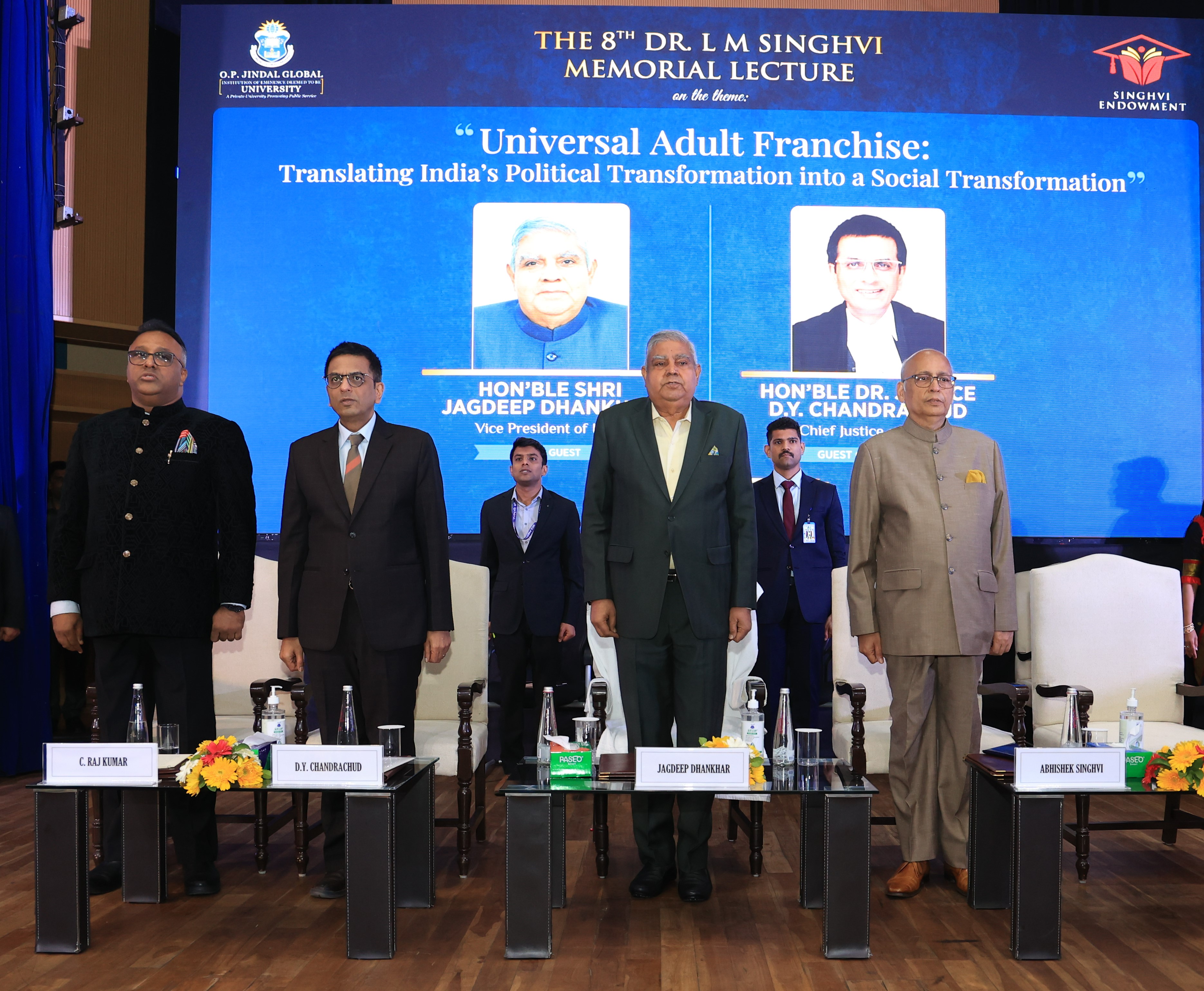Vice President’s remark likely to add more fuel to the ongoing heated debate on ‘judiciary-legislature’ supremacy.
New Delhi: Vice President Jagdeep Dhankhar on Friday questioned the Supreme Court of India for “running down” provisions of law that are passed by the Parliament. This is likely to add more fuel to the ongoing heated debate on the “judiciary-legislature” supremacy in which government representatives have in the past stated that the Supreme Court should be mindful of the “Lakshman rekha” that separates the function of the judiciary, executive and the legislative.
Dhankhar, who was addressing the 8th LM Singhvi Memorial lecture, during his 35-minute address, in an oblique reference to the Supreme Court striking down the Constitutional Amendment that would have paved way for a National Judicial Appointments Commission to appoint judges to the higher judiciary, said that “such instances do not have any parallel in any other democracy in the world”.
“India in 2015-16 was dealing with a Constitutional amendment act and as a matter of record, the entire Lok Sabha voted unanimously and there was no abstention in Lok Sabha and that amendment act was passed. In Rajya Sabha, there was no opposition. We the people, their ordainment came to be reflected through the most sanctified mechanism through the applicable mechanism. That power was undone. The world does not know of any such instance. I appeal to all judicial minds to please think of a parallel in the world where a constitutional provision can be undone,” he said.
The topic of the lecture was “Universal Adult Franchise: Translating India’s Political Transformation into a Social Transformation”. Apart from parliamentarian and senior lawyer Abhishek Manu Singhvi, who had organized the lecture in memory of his father who too was a lawyer, parliamentarian and a diplomat, Chief Justice of India D.Y. Chandrachud was also on the stage during the Vice President’s address.
Sitting Supreme Court, High Court judges, retired judges, serving parliamentarians, Union ministers, chairmen on tribunals, lawyers, members of the press and Delhi Chief Minister Arvind Kejriwal too were among the people in attendance to listen to the views of the CJI and the Vice President. “Our judiciary being one of the critical institutions of governance cannot be the executive or legislature. The doctrine of separation of power is fundamental to our governance. Any incursion, howsoever subtle, in the domain of the other by one has the capacity or potential to unsettle the apple cart of governance,” Dhankhar further stated while asking the people on the stage and in the audience “what will happen if a constitutional provision that carries the ordainment of people at large in such a vibrant democracy, is undone?” Dhankhar added that he was aware that his words will lead to “reaction”.
“After 9/11, the US passed the Patriot Act, not with a full majority. And it was taken as it is. That is why primacy of national interest prevails. Imagine if 73rd and 74th amendments were to be undone. What will happen?” he said reiterating the importance of the Indian Constitution.
Abhishek Singhvi, in his ten minutes address, spoke about the efforts that his father, Laxmi Mall Singhvi, whom he referred as a “man of ideas”, put to strengthen democracy in India. “I recall how while I was standing near him as a teenager, he simply put pen to paper and drafted the law day Charter within a few minutes over four decades ago. He told the Supreme Court Bar Association over which he presided four times that it was a major omission for India not to recognize the day the Indian constitution was completed and thus was born by the honourable Prime Minister who re-christened it officially as Constitution Day,” Singhvi said.
Recalling his contributions to nurture India’s global outreach, Singhvi spoke about how his father played a key role in building a bridge with Indians who were staying abroad. “When he told Prime Minister Vajpayee (Atal Bihari Vajpyee) that the ancient Indian philosophical concept of Sethu Bandhanam (the social cultural and emotional bridge that connects India with Indians globally), Vajpayee insisted on appointing him as a Cabinet ranked chair of the Pravasi Bharati project and thus was born the Innovative report which led to the entire Pravasi Bharati movement, including its celebration as Pravasi Bharati Divas when India’s most famous NRI Gandhiji returned to India on 9th January.”
Singhvi also spoke about how L.M. Singhvi impacted the Lokpal movement in India. “As a 30-year-old parliamentarian fresh from Cornell, Harvard, Berkeley and after a recent study visit to Sweden in the early 60s when Dr L.M. Singhvi incessantly talked about the Ombudsman movement, Nehru quizzically asked him ‘you give speeches all the time on Ombudsman young men. To which zoo does this animal belong? You must indigenize it.’ Since L.M. Singhvi could converse in Sanskrit, he instantly coined the phrase Lokpal and Lokayukta which passed into the Indian legal and parliamentary lexicon,” Singhvi stated. L.M. Singhvi also prepared the report that led to the 73d, 74th amendment in Parliament which gave Constitutional power to the Panchayati Raj institutions.
CJI Chandrachud, while addressing the audience, spoke extensively on the topic of the event and said the introduction of universal adult franchise was “a revolutionary idea” at the time when such a right had only recently been extended to women, people of colour and the working class in supposedly mature western democracies.
“Our constitution was a feminist document and was truly a product of Indian Imagination. Drafters were aware that political equality would not suffice to remove social inequalities. Universal Adult Franchise (UAF) played a key role. For the marginalized, it was the constitution which gave them the rights. Those who were earlier denied rights and power now became a deciding force in selecting the composition of Parliament and thus UAF led to social transformation and it provided rights to social communities whose right to believe in themselves was also taken away,” he said.

